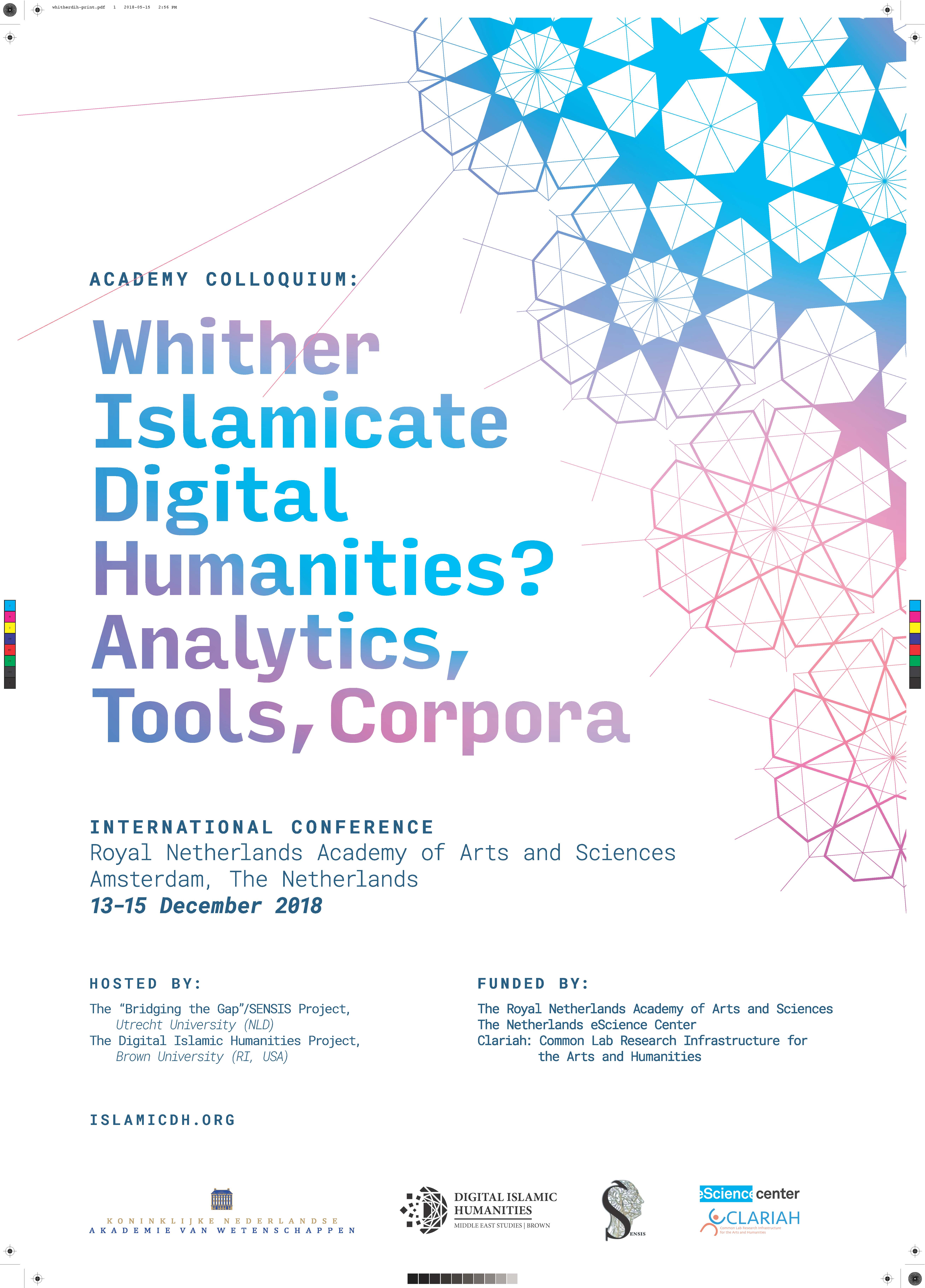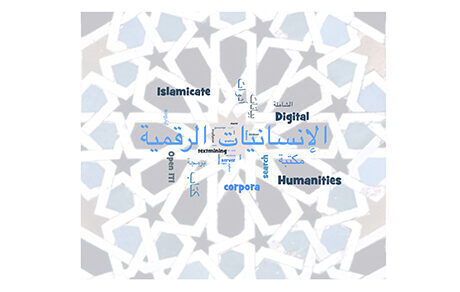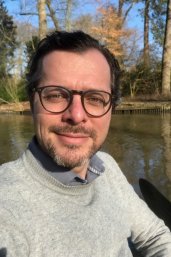
INTERNATIONAL CONFERENCE
ROYAL NETHERLANDS ACADEMY OF ARTS AND SCIENCES, AMSTERDAM (NLD), 13-15 DECEMBER 2018
Funded by the Royal Netherlands Academy of Arts and Sciences & the Netherlands eScience Center
Hosted by the “Bridging the Gap” project, Utrecht University (NLD), and the Digital Islamic Humanities Project, Brown University (RI, USA)
Keynotes: Elias Muhanna and Eric Atwell
“Whither Islamicate Digital Humanities? Analytics, Tools, Corpora” is a three-day international conference dedicated to the budding field of Islamicate Digital Humanities (IDH). In recent years, the number of projects, initiatives and research programs in this field has greatly increased. Recognition of these efforts has already resulted in the formulation of guidelines for the evaluation of digital scholarship by the Middle East Studies Association, as well as a recent proposal for a set of principles to guide scholarly corpus building (IJMES 50, “Roundtable”). These developments signal a field gradually coming of age. Yet, most scholars would also agree that much work remains to be done before a plug-and-play, one- click survey of the vast Islamicate textual heritage becomes even remotely realistic. This conference seeks to take stock and showcase efforts currently underway in global IDH text- mining and identify ways of promoting collaboration and synergy.
PROPOSALS (< 500 WORDS) FOR 20-MINUTE PRESENTATIONS ARE SOLICITED BY 31 MAY, 2018, IN THE FOLLOWING AREAS:
Corpora
The building of scholarly corpora is a crucial factor in the further development of IDH. How to make sure that these corpora are not only useful for the researchers who created them, but also for others who wish to benefit from them in the future? How to address the issue of past and present selection biases in the building of corpora? How truly Islamicate are existing efforts in linguistic terms? How should we take into account issues of copyright and citability in the building of pre-modern and modern corpora? Which corpora have been built in the area of Islamicate DH? Which ones are currently under construction? Which ones should (or should not) be built in the future?
Tools
From stemming to text-reuse and topic modelling, a range of analytical tools have been developed in recent years (or are being developed) to enable digital analysis of various corpora. This section will feature hands-on presentations that introduce and critically discuss a number of these tools. Which tools deliver the best results? Which are useful for the broader scholarly community? How can we promote the interoperability and sustainability of these tools? How can we create tools that use the peculiarities of the Islamicate textual heritage?
Analytics
While many successful applications of IDH replicate existing and well-proven qualitative research methods, how does IDH open up possibilities for new questions and methods? Thissection invites papers especially in the emergent area of Cultural Analytics, that is, “the analysis of massive cultural datasets and flows using computational and visualization techniques”. How can we combine the possibilities of computational analysis of quantitative data (distant reading) with qualitative research methods (close reading)? What is good practice in Islamicate, digitally driven Cultural Analytics? What are convincing (and perhaps not so convincing) examples of the research done so far in IDH?
The conference organizers explicitly welcome papers about Islamicate languages other than Arabic, with the intention of discussing the contours of a globally conceived Islamicate DH.
Please send, by the deadline of May 31, your title and paper proposal (< 500 words) to martine.wagenaar@knaw.nl
A number of travel grants are available for speakers. Please indicate when submitting your proposal whether you think you may need financial assistance in order to attend the conference, and whether you’d be able to come with no or partial funding.
Venue: KNAW, The Trippenhuis, Kloveniersburgwal 29, 1011 JV Amsterdam (route description)
|
|
|
|
Thursday 13 December 2018 |
|
|
10:00 a.m. |
Masterclass (PhD-students, Research Master students), “Bridging the Gap”, Team UU |
|
1:00 p.m. |
Opening, Christian Lange and Melle Lyklema (Utrecht University) |
|
|
Introductory Talks: Computational Methods and the OpenITI Corpus: Next Chapters |
|
1:15 p.m. |
Sarah Savant (Aga Khan University-ISMC) KITAB: Work Flows and the Challenges of Our Corpus |
|
1:45 p.m. |
Maxim Romanov (University of Vienna), Prospects of Corpus-Based research |
|
2:15 p.m. |
Masoumeh Seydi (University of Leipzig) Challenges: Data Preparation and Evaluation |
|
3:30 p.m. |
Sharon Tai (Harvard University) Methods in Digital Islamic Law: Discourse Analysis on Textual Corpora |
|
4:00 p.m. |
Christian Lange (Utrecht University) The Utrecht digital furū’ al-fiqh corpus: Challenges, promises, and some preliminary results |
|
5:00 p.m. |
Keynote: Elias Muhanna (Brown University) The Analog Humanities in the Digital World |
|
6:00 p.m. |
Discussion: Travis Zadeh (Yale University) |
|
Friday 14 December 2019 |
|
|
|
Panel “Analytics” – Chair: Umar Ryad |
|
9:30 a.m. |
Maroussia Bednarkiewicz (Oxford University) Seeing relations in time and space: Scalable visualisation in Ḥadīth studies |
|
10:00 a.m. |
Ed Hayes, Munirah Eskander and Paul Vierthaler Documents and digital analysis in assessing the Early Islamic Tradition |
|
10:30 a.m. |
Emad Mohamed (Indiana University) and Eid Mohamed (Doha Institute for Graduate Studies) Building a fatwa network |
|
11:00 a.m. |
Samuel Ross (Texas Christian University) How Representative is the Corpus of Digitized Arabic Qur’an Commentaries of the Tafsīr Tradition? A Typological, Chronological, and Codicological Assessment |
|
|
Panel “Tools” – Chair: Melle Lyklema (?) |
|
1:00 p.m. |
Daniel Mahony (Austrian Academy of Sciences) The Social Lives and Networks of Late Medieval Yemen in Transformation |
|
1:30 p.m. |
Will Hanley (Florida State University) Names as Ontology |
|
2:00 p.m. |
Jo van Steenbergen (Ghent University) From MP3 to MPP. ‘Mamluks’, Arabic historiography, and the semantic web |
|
2:30 p.m. |
Matthew Miller (University of Maryland) Developments in Arabic-script Optical Character Recognition: Technical Advances and Organizational Barriers
|
|
|
Panel “Corpora 1” – Chair: Cornelis van Lit |
|
3:30 pm. |
Daniel Kinitz (Leipzig University) The bio-bibliographical research platform Bibliotheca Arabica |
|
4:00 p.m. |
Alexandra Plesa (Amsterdam Free University) Patterns of Dress Change in the Early Islamic Egypt: Mining Archaeological and Papyrological Data about Dress |
|
4:30 p.m. |
Sean Pue (Michigan State University) Building an Urdu-Hindi Poetic Corpus for Computational Humanities Research |
|
|
|
|
5:00 p.m. |
Matthew Lynch (Bard College) Mapping the Qur’an within ‘the Persian Qur’an’: Digital Tools for Analyzing the Masnavi-e Ma’navi’s Instrumentation of Islamic Scripture |
|
Saturday 15 December 2018 |
|
|
|
Panel “Corpora 2” – Chair: Elias Muhanna (?) |
|
9:30 a.m. |
Cornelis van Lit (Utrecht University) Digital Codicology of Islamic Manuscripts using Python and OpenCV |
|
10:00 a.m. |
Justin Parrott (New York University at Abu Dhabi) Arabic Collections Online: Beyond the Download |
|
10:30 a.m. |
Alicia Gonzalez (Hamburg University) The COBHUNI Corpus: how to develop a robust and modular architecture for collecting and enriching a corpus on Islamic literature |
|
11:00 a.m. |
Till Grallert (German Oriental Institute Beirut) Open Arabic Periodical Editions: a framework for bootstrapped scholarly editions outside the global north |
|
11:30 a.m. |
Keynote 2 and concluding thoughts: Eric Atwell (University of Leeds) |



